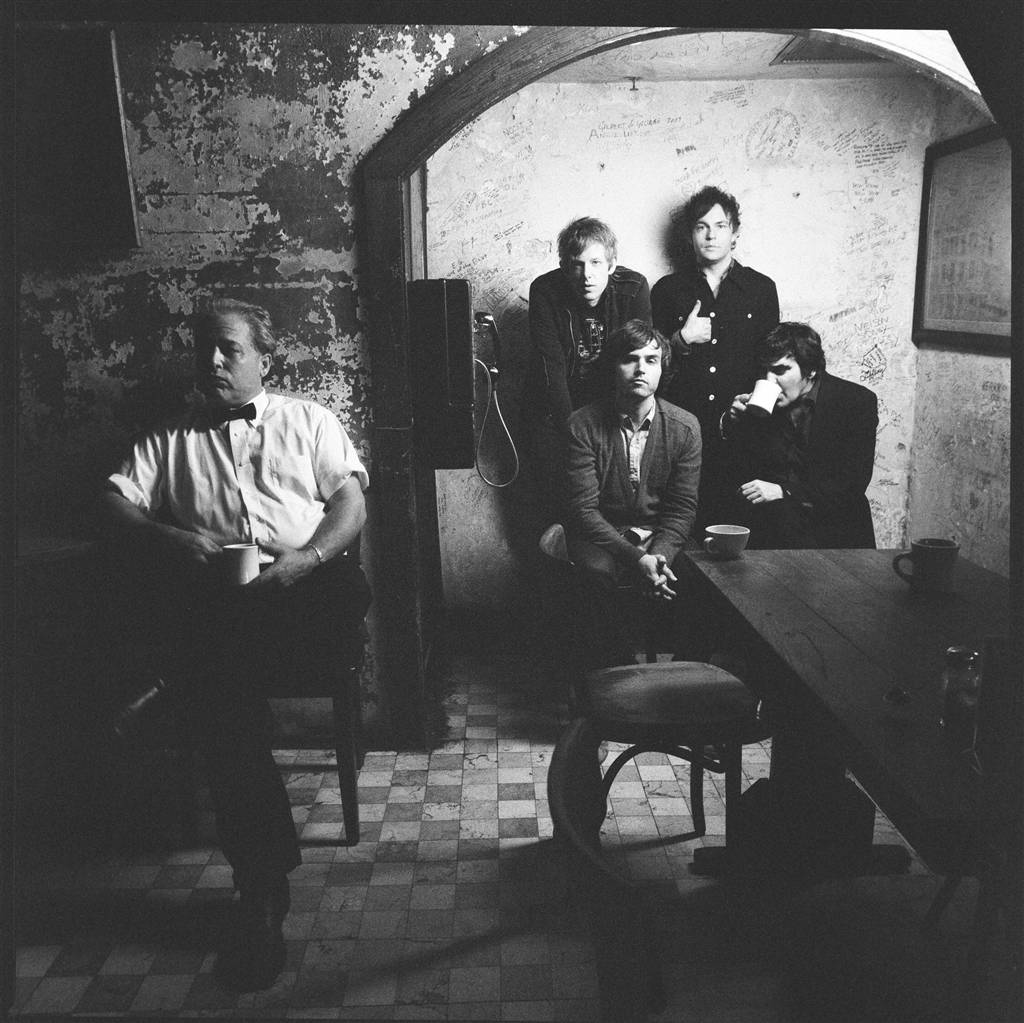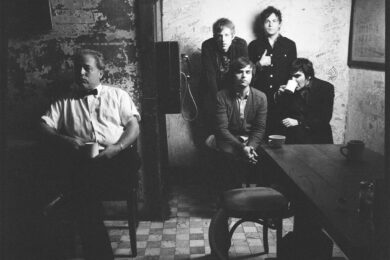Spoon occupy a unique position within the attention deficit world of blog-friendly U.S. indie rock. Formed in the early ‘90s, the band released two albums in the wake of the alt-rock boom before being dropped by Elektra. It was an admitted low point that nearly broke the Austin, Texas quartet but they eventually regrouped post Y2K with LP number three, Girls Can Tell. Abandoning the respectable but largely textbook college rock of its predecessors, Girls… established what is now widely recognised, at least in the States, as the Spoon sound – stripped down, studied guitar pop informed by Elvis Costello’s bookish sneer and The Pixies’ sunnier moments. It was a sound loved by the nascent music bloggers who were only just starting to find their pixelated legs at the time.
Spoon have, unlike the many who followed, retained their indie darling status ever since, unleashing a new album every few years, each one offering a slight twist on its predecessor without ever veering far from the trusted formula of pop, rock and a bit of grit. The response to each album has been so consistent that Spoon came out on top during Metacritic’s best of the decade roundup simply by virtue of having the highest total average score. It’s been a slow but steady rise which has culminated with new album Transference debuting at number four in the US charts.
The group’s story is one of proper hard-graft instead of the terminally accelerated hype cycle that dominates almost everything today. And yet, even with the UK’s love of an underdog still going strong, it’s a tale that hasn’t transferred well to these grey isles. Even with traces of The Kinks and other classic British acts clearly visible in Spoon’s DNA, UK indie fans have made little room on their hard drives for the Austin group’s records.
The Quietus recently ventured out to Camden on a rainy night to meet Spoon frontman Britt Daniel and drummer Jim Eno, the two men who have been at the centre of this truly all American success story since the beginning.
The new album debuted at number four in the US. How does it feel after 16 years as a band together? Do you feel vindicated by it?
Britt Daniel: Oh, I’ve long since felt vindicated.
Why?
Brit: Cause, we get to do what we want to do. We don’t have to answer to anyone. We don’t have to work.
I was going to ask, you don’t have proper day jobs any more.
BD: Right.
Does that make you feel like proper rock stars?
BD: Vulgar rock stars…
Vulgar in what way?
BD: Well, we’re not exactly proper. We’re rock dudes. We’re not rock stars. We’re lifers.
What’s the difference between being a rock dude and a rock star then? Being a lifer?
BD: I guess so, yeah.
Going out and just doing your thing?
BD: Yeah, we’re actually obsessed with music. Obsessed with records. Think about them all the time.
So was the chart placement a goal you were aiming for or was it just a nice surprise?
BD: You know, it was neither one (laughs). It was not a goal and by the time the record was coming out all the people we work with had pretty high expectations for how the record was going to do. They gauged the market.
How’d you feel about it? Did you feel the same?
BD: Yeah, well, they weren’t saying that based on the quality of the record. They were saying that based on market indicators and how many records they were actually getting into store and what the pre-sells were on iTunes. We all thought it was good. We thought we deserved number one.
The new album’s been by and large critically loved. Do you guys read your press?
Jim Eno: Britt reads my press.
BD: I just read his interviews to him.
JE: [laughs] I like it.
BD: I’ll be reading this one to you later.
JE: He’ll read a quote…
BD: This one will go in verbatim, right? It’s one of those, right?
Absolutely. So, you don’t read the press too much then? You don’t let it affect your output as a band?
BD: Well, it’ll get filtered into our little circle, over the world.
JE: Do they only send the good ones to us?
BD: Naw, I think they…I don’t know. That’s a good question.
JE: I think they do.
BD: I try to not read them. If something remarkably colourful happens our parents tend to tell us. My mom’s always asking me, ‘Why don’t you tell me about this big news, that you did this interview’. I’m like, ‘Mom, jesus, I did 20 interviews that day.’
‘You have to let us know these things.’
JE: My mom’s latest thing is to go to the grocery store and then tell people about Spoon and then ask them if they want a signed poster.
>BD: What? People at the checkout counter?
JE: Yeah. She tends to talk to people if they have a tattoo or a piercing. ‘Do you like alternative rock’ as a lead in and then ‘have you heard of the band called Spoon?’ and then I start getting poster requests.
From your mom?
JE: From my mom. I’m like ‘Mom, you got to stop. You can’t…
BD: ‘…but the checkout lady at…’
JE: ‘…she’s been a huge fan for a long time and she said that she’d really like a poster.’
Have your parents been supportive the entire time, or did they ever tell you that perhaps it’s time you got proper jobs?
JE: My parents have been very supportive. I had a job until, like, three-and-a-half years ago. [Looks at Britt] But you, your family…
BD: My parents were pretty supportive but there were times, like when we parted ways with Elektra records, which was sort of a low point for us. When that happened, I remember getting a card from my dad and step-mom saying something like ‘Well that door’s closed Junior, but there are other careers. You will find other things to do with life.’
JE: Do you still have that postcard?
BD: I’m sure I do.
Why keep going then and not do what your parents told you?
BD: I’ve never done anything my parents have told me to do [smiles]. Uh, I don’t know. It’s because I believe in music. It’s all I’ve ever wanted to do.
Would you call yourself a rock band or a pop band?
BD: A rock band.
Your new album is a mix of demos and studio takes. Why mix it up like that? You even do it within the space of a single song.
BD: Because we were trying to get the best representations of each song that we could and we thought that some of those demos, those songs that we recorded as demos wouldn’t sound as good recorded another way. There were some songs that we did try to record another way and said ‘You know that cassette that we got at the rehearsal space, we never got a take that was anywhere near as good so we might as well go back to that one.’ We knew what we were getting into. We knew it would be a fidelity issue but like that’s where ‘Trouble Comes Running’ came from. It’s very spirited that take. It’s hard to recreate that.
JE: ‘Before Destruction’ was such a strong demo and it sounds real good too.
BD: We gave it a proper mix. A ‘vulgar’ mix maybe.
Do you intentionally switch from glossier production to rougher sounds between albums? Kill the Moonlight had an edgier feel than Girls Can Tell. Ga Ga Ga Ga Ga was incredibly polished compared to Transference.
BD: I think that’s a natural, mostly unconscious reaction. You tend to just want to go somewhere different…at least we do. I don’t know what Kings of Leon do but that’s just the kind of guys we are.
JE: Plus, if you use parts of demos or practice space tapes it’s going to sound rougher anyway.
Was there ever a fear that you would alienate the fans you made from Ga Ga Ga Ga Ga?
BD: You know, my thought was that we can’t keep making the same kind of record. At this point we’ve made six or seven and you can’t keep trying to best yourself, you’ve just got to make different types of records, so I think that’s the best thing you can do for your fans is to keep trying to challenge yourself. If you’re not challenging yourself you’re going to end up with these records that are kind of half-assed. I’m glad that we’re free to stumble a little bit and we’re not in a situation where it’s not okay to make a record that might alienate some people.
Is that because you’re on Merge?
BD: Yeah, because we’re on Merge and we’re lucky enough to have built up a fairly great loyal fan base.
JE: In the States. Not here.
I was going to ask – you’re doing six dates here. You don’t normally tour Europe much in the first place. Is that because you prefer touring the States?
BD: No…cause, yeah, because it’s closer. We’re doing an eight-month tour of the states. We come over here and it’s expensive and get different responses. It’s kind of like ‘Do we want to take a European vacation? That we’re paying for ourselves? Sure.
We’ll go do that for a week.’
JE: It’s not even much of a vacation. We haven’t had any time during the day.
BD: It’s not that we’re not keen but in some ways it’s economics.
JE: And there’s a lot of places to tour. Australia, Japan and The States…
BD: We do well in Australia.
But do you ever think that your music, being this kind of intelligent rock with a pop edge might appeal to Brits?
BD: Brits of the ‘60s, ‘70s and ‘80s.
JE: We were thinking that a long time ago that they would appreciate it but it just hasn’t really happened.
BD: What do you think? Do you think that people in England are listening to music like ours?
Some do. Brits can also be cynical and get a bit put off when they hear Americans trying to push what are perceived Brit sounds back their way. A friend thought you were too American sounding for her taste.
BD: Who does your friend listen too?
She likes pop. Like Lady GaGa.
JE: What makes us too American? What does she hear?
BD: She might have never heard The Kinks.
She likes The Kinks. I can’t give you one reason but a band like Kings of Leon are very big here and they’re very American. So I was wondering why you think…
BD: You’re asking us why we think Brits might not like us? Um, let me just…I hesitate to speculate.
JE: I don’t know. I think a lot of the times [the American bands that come here], they’re often really young bands.
BD: I don’t know, I think it has to do with…I think we appeal to solid music lovers. The people in this country haven’t been exposed to us a whole lot. We’ve done what we can.



